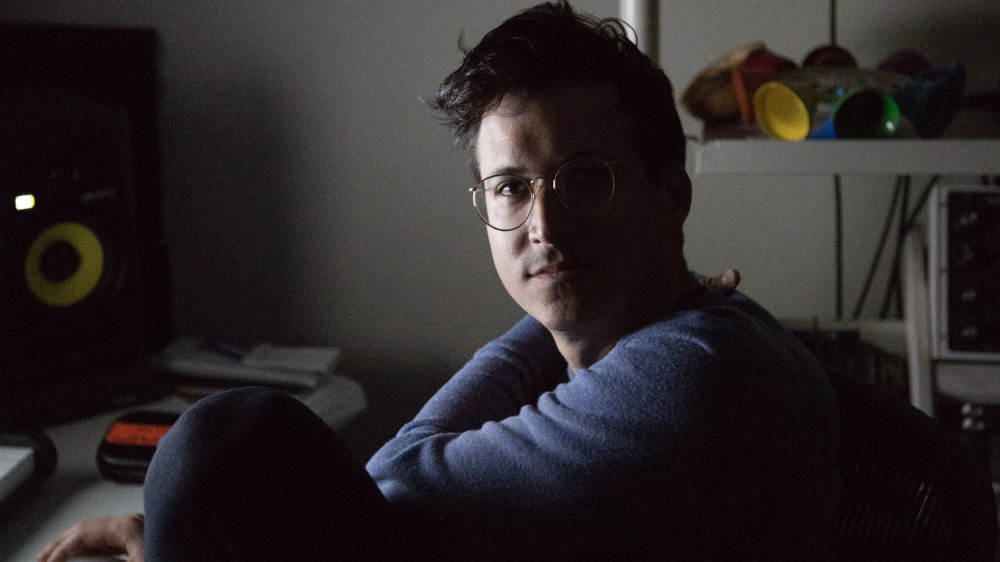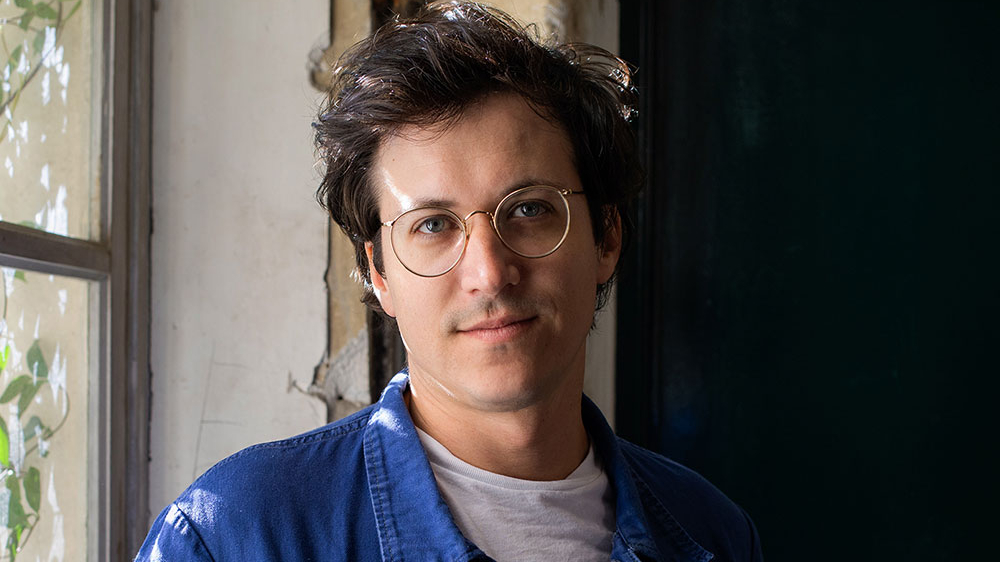
It’s fitting that for my very first interview for Below the Line, I’d be talking to one of my oldest friends, Jeffrey Brodsky, who grew up across the street from me in Needham, Massachusetts as the son of a doctor and a music teacher, one who no doubt passed her own musical talents onto her son.
We were the only two Jews at the bus stop — a couple of Jeffs born a month apart — and though we went in different directions upon entering high school, destiny would bring each of us to Hollywood via distinctly different paths.
I grew up to be a reporter, while Brodsky went on to become a composer, producer, sound designer, and drummer who has toured the world with popular bands such as Yacht and RAC. In recent years, he has started composing music for film and television, including the HBO miniseries Sharp Objects and the hit comedy show 2 Dope Queens.
Brodsky made his feature film debut as a composer with the indie movie No Light & No Land Anywhere, but this weekend brings his biggest movie yet — Hulu’s teen comedy Sex Appeal.
The sweet-yet-sexually-charged film hails from director Talia Osteen, writer Tate Hanyok, and the fine folks at American High (Plan B, The Binge), and it stars Mika Abdalla as Avery, a teenage overachiever who enlists her best friend, Larson (Jake Short), to help her prepare to lose her virginity to her long-distance boyfriend. Avery thinks she can get good at sex by studying it like it’s algebra, but that overly intellectual approach causes problems, and she quickly learns that there’s no one formula for sex appeal.
Brodsky created the score on a computer in his sound laboratory, and I found it funny that I’d be interviewing him for a teen sex comedy all these years later, seeing as how the two of us first learned about sex by sneaking into his parents’ bedroom and leafing through his father’s Playboy collection. Little did we know, something called the internet was about to change the game in terms of sexual education…
Check out my interview with Brodsky below, and if you’re looking for a few laughs this weekend, be sure to watch Sex Appeal on Hulu.
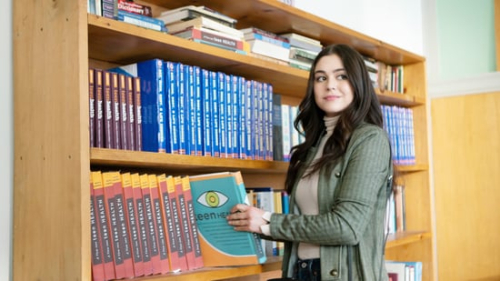
Below the Line: So how did you first get involved with this project?
Jeffrey Brodsky: The director, Talia Osteen, is actually somebody I know. She’s originally from Needham, and our moms are old family friends, but she moved to Orlando when she was like, 10 years old. She’s also a composer and comes from the world of composing, but she wanted to pivot into directing. So she was putting a director’s pitch together and basically making a faux trailer, where she kind of took a bunch of footage from other high school movies that she thought might have a similar tone to this film, and then she did voiceover over a montage of other teen movies, using the opening monologue that Avery gives.
So she was looking for music for that, and she was going through some libraries and music catalogs, and she was like, ‘Oh, I really like this. Wait… Brodsky?’ and she reached out and asked, ‘Is this your music? Can I use this for my director’s pitch?’ and I said, ‘yeah, of course!’ So she did that and she landed the job, and then she came back to me and said, ‘that vibe is something I’d be curious to do for the whole score,’ and I said ‘great, let’s do it.’ And she said, ‘let’s do it!’ So that’s how I got involved. And that music was pop with the kind of high school marching band/hip-hop stuff, so that was the jumping-off point, aesthetically, for how to approach this.
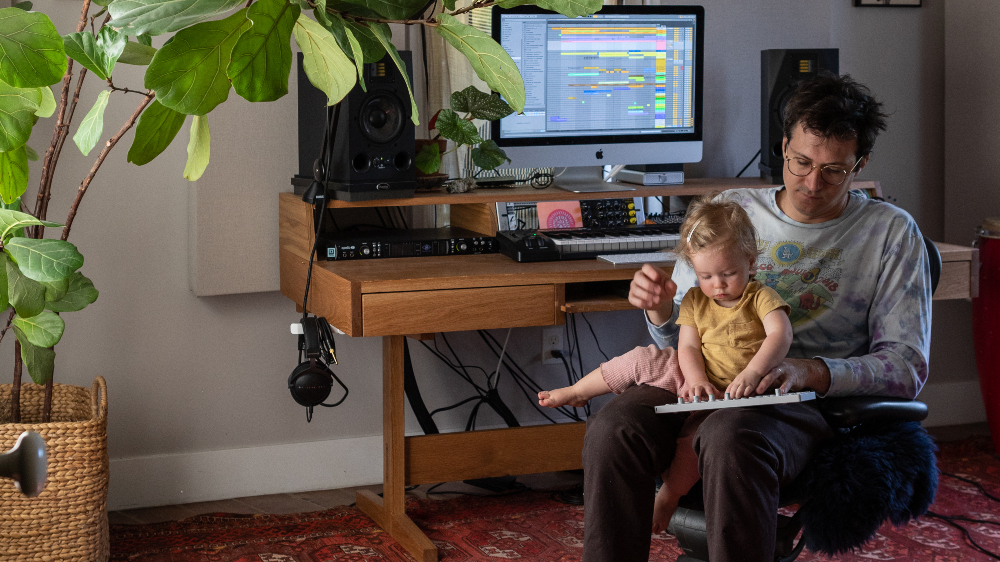
BTL: How did you first break in as a composer?
Brodsky: I had broken in as a composer by always being in music, playing in bands for many years but kind of knowing I couldn’t do that forever. I’ve always kind of been a musician of the modern ilk, where you have to be a jack of all trades. You have to be able to play instruments, write songs, and then produce and record your own material, and know how to use software and synthesizers and all the things on the computer, so I’ve always kind of been honing those skills since forever. And I’ve been working in the commercial domain, writing, producing and composing for commercials, and that kind of gave way to small film projects and an earlier feature.
I still largely do co-writing and co-producing for other artists, and composing for commercials, but then this came along and I was like, ‘yeah, I think I’m ready for a real feature.’ The first feature I did was very moody, with lots of drones and weird arthouse stuff, so this was way more pop, and hitting the emotional beats kind of project. So this was kind of my first foray into that, with a feature, but I felt like I’d cut my teeth on so many other smaller projects, producing and composing for commercials and working with other artists.
BTL: Did you go back and watch any teen sex comedies in preparation for this job?
Brodsky: I watched all the other American High movies, and I thought those had some pretty clever scores. They hired some interesting people and I thought those came together nicely. I had never seen To All the Boys I’ve Loved Before, which is one of the bigger streaming, new-school teen comedies, and I thought that was really good. I think what drives a good teen comedy score are syncs, songs that they license, and plucking songs from the world of what high school teens are listening to already. I know that with this movie there were some constraints, so they had to lean more on score, so it was kind of my job to make certain moments feel like, not just like a string swell or a moody piano thing, but really feel like songs, and feel kind of poppy and propulsive, and feel like a real track that a kid would want to listen to, and not just a cue on a soundtrack.
I listened to the whole history of teen comedies. For example, I listened to the Sixteen Candles soundtrack, which was so dated, and the way that they signal mood — sad, curious, romantic — does not line up with how you would do that today.
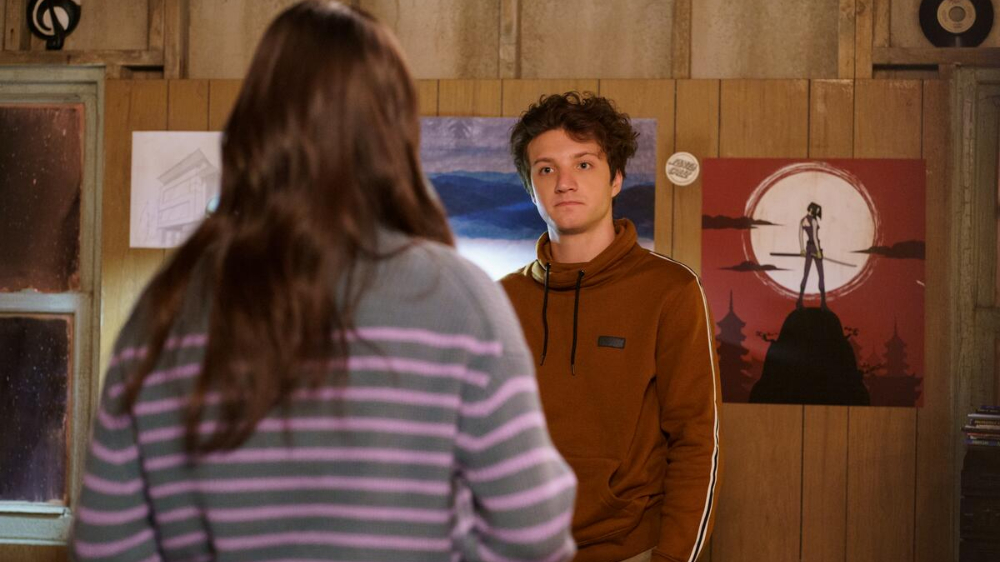
BTL: It felt to me like the synchronized swimming scene was the biggest showcase for the music in this film. Was that a fun challenge for you?
Brodsky: That was a huge project, because there was so much trial and error with that. It was like, how do we make this sound kind of classic, and feel like a ’50s synchronized swimming movie without being too nostalgic? And then also, do it within the resource constraints we had. We couldn’t hire an orchestra or a big band to play that, so we had to lean on some sampling and some modern production techniques. There was a lot of trial-and-error, we tried many, many things to make that work.
BTL: I also enjoyed the “rocket launch” sequence, which allows you to veer into sci-fi thriller territory.
Brodsky: Yeah, there are a lot of these comedic moments and genre references that required me to be versatile. I feel like certain composers of a certain tier can do whatever they want. I went back and watched the opening sequence of The Social Network to see how Trent Reznor got into this world, because he comes from electronic music and doesn’t have traditional, classical composer training, and you go back and listen to that opening sequence, and if I turned that in as kind of, like, the lowest guy on the totem pole of power within that production, they’d say, ‘no. No way! This is like a horror cue.’
But Trent Reznor can hand them whatever he wants and if he says ‘this is what we’re doing,’ they trust him. And I think it’s a beautiful piece of music, the weird, melancholy piano thing he did for that. But with a movie like this, you can’t do that. You can’t get away with doing something entirely left-field. There are so many beats, and there were so many weird little genre references, like the synchronized swimming sequence and the kind of tense, sci-fi thriller feeling of the rocket launch sequence, that you need to be able to do all of those things. You can’t just be like, ‘eh, I’m gonna do my own weird, electronic score across the whole score, no matter what the movie is.’
So that was a challenge, but I think that’s maybe why I landed the job. Because I can do your big-band, synchronized swimming thing, I can do tense sci-fi cues, I can do cute, poppy stuff, and marching band stuff, and I can do the somber piano beats in the third act of that movie. And I think to land jobs these days, you kind of have to be that person. I think a lot of people who specialize in one thing and barrel through the industry with confidence can be like, ‘yup, that’s my one thing, hire me for that.’ And that’s a great place to be, but until you’re there, you have to be able to do everything.
BTL: I noticed you have about a half-dozen songs on the soundtrack, including one that you co-wrote with Robin Schorr, who’s a former film producer I’ve known for years. Can you talk about the soundtrack and your collaboration with Robin a little bit?
Brodsky: Robin is great, and I think she has pivoted to being like a mentor and a matriarch in the music world, in the co-write/publishing music for sync and licensing world, where she has found a lot of singers and artists and producers, like myself, and then links people together and gets them to write together, and then pitches that work to movies and TV shows and commercial projects.
I’m moving more and more into this direction in the co-writing world, where you work with a singer and maybe one other instrumentalist, and you co-write songs. Traditionally, it’s thought of like the publishing world, where young musicians move to LA and they’re like, ‘oh, I want a pub deal. I want Universal Music or Warner Chapel or whoever to pay me a fee to start writing songs for Katy Perry and Justin Bieber and people like that.’ And I’ve always avoided that world, and I’m very glad I have. When I first moved to LA, I was kind of jealous of people who were like, ‘Oh, I’m doing co-writes with Dr. Luke or Max Martin, and I’m gonna have a song on the new Kesha record,’ or whatever. And that stuff is always a trap for young talented producers. They get sucked in, and then those labels or entities own everything they do, and there are a lot of constraints on them. So Robin is the kind of person who’s like, ‘lets all freelance, get together, write stuff, and pitch it using our own network of people outside of the kind of top-down industry world of labels and whatnot. And it feels like that’s where the industry is going. I know it’s been great for me. Alongside movies and commercials, I’m writing with artists and we’re cultivating young singers and artists’ careers, but also looking for a good Apple commercial or a good Nike commercial that pays everyone’s bills and allows everyone to continue doing what we love to do.
And as far as the soundtrack goes, I think they were looking for good stuff they could make work within the budget, and I was able to accommodate and make it work on that level. I think I’ve also written some cool stuff, and worked with some great artists on some poppy stuff that I think high school kids would be into. So I told the music supervisor, Black Market Music, ‘hey, I have a catalog of songs and I’ll bro-deal you good rates,’ and they were great. They have good taste and had a good vision for this.
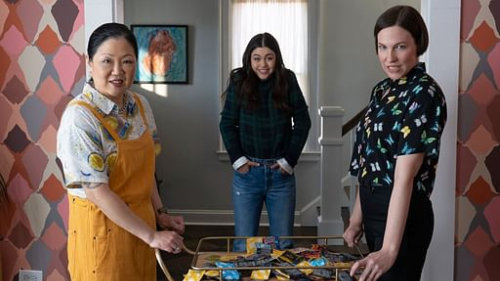
BTL: Are there any filmmakers you’d love to work with one day? Or genres of film you’d like to work in?
Brodsky: I don’t know… maybe Ari Aster? I’d love to do a sci-fi horror/thriller thing, and just make things so dark. Horror movies, from a production point of view and an art department point of view, are some of the most interesting movies that get made, because sound and music are so important to sending chills down your spine, and you can do that with a nice piano, but you can also do it with a weird, electronic shriek, and I love doing that stuff and I want to do more of that stuff.
So much of composing is coming up with harmonic and melodic ideas that serve picture in such a way. Oh, he’s telling her that he’s in love with her, and he’s been working up the courage, so the music has to sound kind of excited and happy, and then she tells him ‘I don’t feel that way and just want to be friends,’ and he walks away defeated, so it’s kind of sad, and you have to figure out a way to have the mood shift from major to minor. I’d prefer to just take a bow and bow a piece of rusted metal and then process the sound electronically, and then have that over picture. That’s more of my domain.
BTL: Do you have any favorite composers yourself?
Brodsky: It’s stupid. but I do think Trent Reznor does a really good job, and this is also stupid, but I do love Philip Glass. I’ve been listening to him a lot recently, and everyone has ripped this guy off for years. I also loved the Bobby Krlic score from Midsommar. He’s really talented and he’ll be doing a lot of stuff going forward. What’s interesting is I’ve found myself listening to film music more and more in the last couple of years. I don’t know why, but I love it, and it serves a purpose. It’s more than just the music, it’s serving picture somewhere. Also, Jonny Greenwood. He’s one of my first loves. He’s great. His Phantom Thread score is so beautiful, and he scored, like, three movies last year! And Michael Abels, the guy who did Us! I also like young guns like Daniel Hart and Emile Mosseri, and I especially love the music of Ernst Reijseger, who did a lot of Werner Herzog’s movies. Also, Hildur Guðnadóttir’s scores for Joker and Chernobyl are some of my faves.
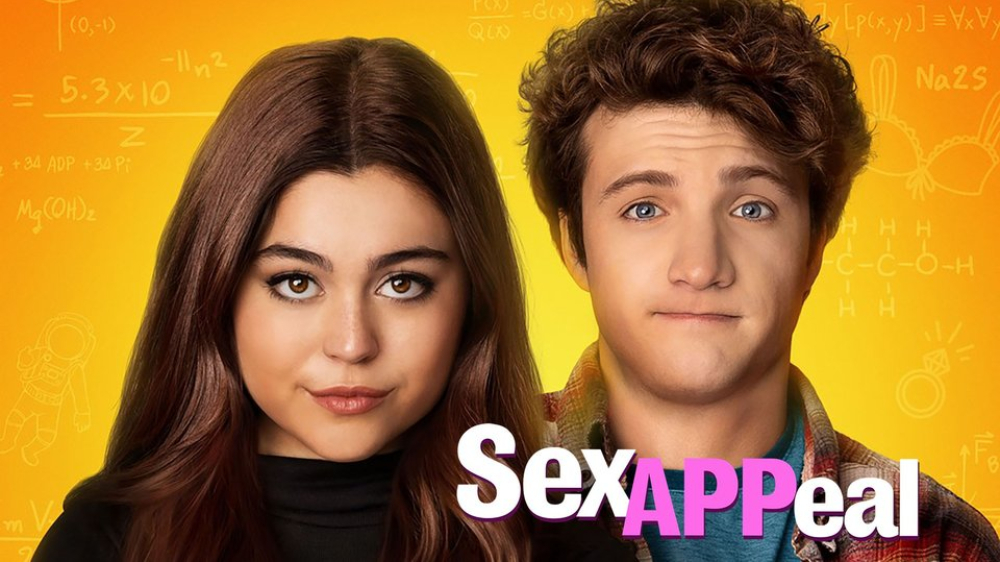
BTL: What did you think of the Sex Appeal script the first time you read it, and did you visit the set at all?
Brodsky: I did not. They shot in Syracuse during peak COVID. I was actually surprised they pulled it off. Plus, there was a lot of pre-production music, so I had to do some of that synchronized swimming stuff ahead of time.
And when I read the script, I knew that Talia wanted to do some kind of hip-hop-meets-marching-band stuff, but there are a lot of moods and feelings that need to be addressed in that score. The movie is about a high school student developing an app to help her peers get good at sex, so I was like, ‘hmmm, apps, huh?’ So my initial ideas and sketches were done using music apps because I’ve always been a fan of music apps and probably spent too much money on silly iPhone apps.
Some are dumb and simple, but some of them are quite sophisticated and very interesting in ways you can’t find in computer software. They’re very easy ways to get music going quickly, so I just wanted to get some ideas going. The movie is about young kids and technology, so I thought, let’s start generating ideas using some of my favorite music iPhone apps. And once I read the script, it was like, ‘this is great, let’s run with this,’ and I signed on at that point.
BTL: How did your experience playing with Yacht and RAC prepare you to be a composer?
Brodsky: The work ethic, because those were two extremely hard-working touring bands. People just think if you’re cool and you write good music then it happens, but there’s so much hustle and there’s so much prep, and you have to approach things like a job and like a business, and that was an enormous lesson for me in terms of pivoting into the professional realm and the commercial realm, where it’s like, you can have fun, but you also have to show up to a job creatively.
You have deadlines and expectations from clients and notes, and the politics and BS of it all, and you have to keep your cool and show up for all of it, and I think that was a huge lesson for me. I think a lot of people think you just go on tour and it’s all partying and bullshit, and there’s a certain amount of that, but you won’t survive and your band won’t survive if you don’t take it seriously.
BTL: What’s next for you?
Brodsky: I was gonna say, I have a movie coming out in a week! I actually have a writing session with Robin on Monday, so I’m writing and co-writing with a lot of people still, and I’m looking for my next movie project.
